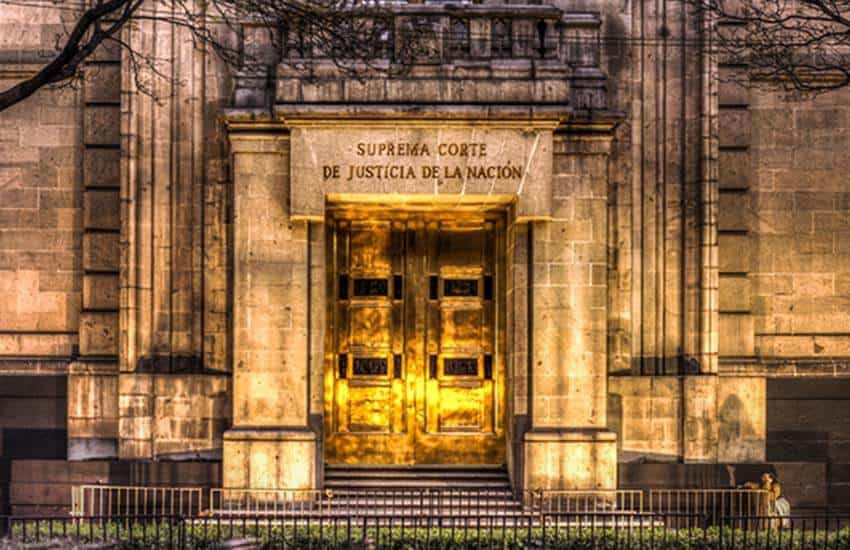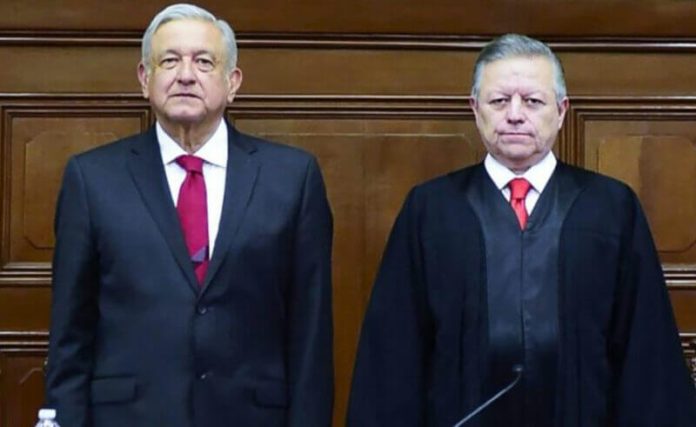President López Obrador and the chief justice of the Supreme Court (SCJN) are at loggerheads over the court’s ruling against the use of preventative custody for people accused of certain crimes.
The SCJN handed down a decision Monday that eliminates preventative detention for suspects in cases of smuggling, the sale of fake invoices and tax fraud.
López Obrador railed against the ruling on Tuesday, saying that it supports corruption and will stop “fifís,” or elites, from going to prison.
“These decisions don’t help the judicial power. Why don’t they act like that when delivering justice for common people? This is about white-collar criminals,” he told reporters at his regular news conference.
López Obrador said people who have committed “large tax frauds” and have become “immensely rich” will avoid preventative prison because the Supreme Court ruled that holding them in custody before trial “affects their human rights.”

“… I don’t agree [with the ruling]. I believe that it continues protecting minorities and punishes only those who don’t … have the money to buy their innocence. I think that [the court] didn’t act properly,” he said.
Chief Justice Arturo Zaldívar, considered a close ally of the president, took to Twitter later on Tuesday to defend the court’s decision.
“The majority of people subjected to preventative prison are people of limited resources,” he wrote. “It’s a sentence without a sentence that as a general rule punishes poverty. We must advance toward a system that establishes preventative prison as an exception” rather than the rule, Zaldívar said.
The chief justice also defended the court’s decision in a video message posted to his TikTok account.
“In the majority of democracies, people are free [while waiting for trial], except in exceptional cases,” Zaldívar said.
“… For a long time in Mexico, we’ve abused preventative prison,” he said, adding that its use frequently delays criminal investigations.
“This has especially affected thousands of poor people who don’t have the possibility of having a high-quality lawyer. That’s why preventative prison, that which is enforced automatically without assessing the circumstances of the case, is contrary to the American Convention on Human Rights,” Zaldívar said.
Mexico has been subject to the convention, a document created by the Organization of American States, since it ratified it in 1981.
The chief justice said the court’s ruling doesn’t mean that dangerous criminals or people who have defrauded the country in a significant way will automatically be granted bail.
The ruling came in response to a challenge filed by opposition senators and the National Human Rights Commission against a 2019 government decree that classified tax offenses as crimes that warrant preventative prison.
A majority of justices took the view that the legislative branch of government went beyond its purview by stipulating the use of preventative custody for crimes that are not mentioned in Article 19 of the constitution.
Zaldívar said in court that preventative detention is “openly unconventional because it’s a sentence in advance — prison when a person’s culpability is not yet proven.”
“Preventative prison completely dispels the principle of presumption of innocence,” he said.
“… The concept of serious crimes against the security of the nation, as set out in Article 19 of the constitution, cannot become a ‘catch-all taxon’ that accommodates the priorities of the politicians of the day.”
With reports from Reforma and El Universal
